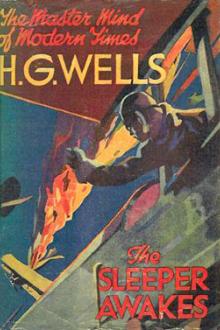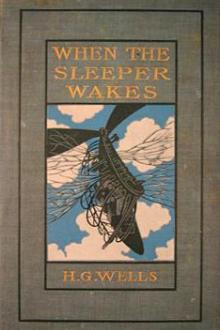The Sleeper Awakes, H. G. Wells [ap literature book list .txt] 📗

- Author: H. G. Wells
- Performer: -
Book online «The Sleeper Awakes, H. G. Wells [ap literature book list .txt] 📗». Author H. G. Wells
Through the open doorway he saw a slight girlish figure approaching. His heart leapt. It was Helen Wotton. The man in yellow came out of the nearer shadows into the circle of light.
“This is the girl who told us what Ostrog had done,” he said.
She came in very quietly, and stood still, as if she did not want to interrupt Graham’s eloquence.... But his doubts and questionings fled before her presence. He remembered the things that he had meant to say. He faced the cameras again and the light about him grew brighter. He turned back to her.
“You have helped me,” he said lamely—“helped me very much.... This is very difficult.”
He paused. He addressed himself to the unseen multitudes who stared upon him through those grotesque black eyes. At first he spoke slowly.
“Men and women of the new age,” he said; “you have arisen to do battle for the race!... There is no easy victory before us.”
He stopped to gather words. He wished passionately for the gift of moving speech.
“This night is a beginning,” he said. “This battle that is coming, this battle that rushes upon us to-night, is only a beginning. All your lives, it may be, you must fight. Take no thought though I am beaten, though I am utterly overthrown. I think I may be overthrown.”
He found the thing in his mind too vague for words. He paused momentarily, and broke into vague exhortations, and then a rush of speech came upon him. Much that he said was but the humanitarian commonplace of a vanished age, but the conviction of his voice touched it to vitality. He stated the case of the old days to the people of the new age, to the girl at his side.
“I come out of the past to you,” he said, “with the memory of an age that hoped. My age was an age of dreams—of beginnings, an age of noble hopes; throughout the world we had made an end of slavery; throughout the world we had spread the desire and anticipation that wars might cease, that all men and women might live nobly, in freedom and peace.... So we hoped in the days that are past. And what of those hopes? How is it with man after two hundred years?
“Great cities, vast powers, a collective greatness beyond our dreams. For that we did not work, and that has come. But how is it with the little lives that make up this greater life? How is it with the common lives? As it has ever been—sorrow and labour, lives cramped and unfulfilled, lives tempted by power, tempted by wealth, and gone to waste and folly. The old faiths have faded and changed, the new faith—. Is there a new faith?
“Charity and mercy,” he floundered; “beauty and the love of beautiful things—effort and devotion! Give yourselves as I would give myself—as Christ gave Himself upon the Cross. It does not matter if you understand. It does not matter if you seem to fail. You know—in the core of your hearts you know. There is no promise, there is no security—nothing to go upon but Faith. There is no faith but faith—faith which is courage....”
Things that he had long wished to believe, he found that he believed. He spoke gustily, in broken incomplete sentences, but with all his heart and strength, of this new faith within him. He spoke of the greatness of self-abnegation, of his belief in an immortal life of Humanity in which we live and move and have our being. His voice rose and fell, and the recording appliances hummed as he spoke, dim attendants watched him out of the shadow....
His sense of that silent spectator beside him sustained his sincerity. For a few glorious moments he was carried away; he felt no doubt of his heroic quality, no doubt of his heroic words, he had it all straight and plain. His eloquence limped no longer. And at last he made an end to speaking. “Here and now,” he cried, “I make my will. All that is mine in the world I give to the people of the world. All that is mine in the world I give to the people of the world. To all of you. I give it to you, and myself I give to you. And as God wills to-night, I will live for you, or I will die.”
He ended. He found the light of his present exaltation reflected in the face of the girl. Their eyes met; her eyes were swimming with tears of enthusiasm.
“I knew,” she whispered. “Oh! Father of the World—Sire! I knew you would say these things....”
“I have said what I could,” he answered lamely and grasped and clung to her outstretched hands.
CHAPTER XXIV. — WHILE THE AEROPLANES WERE COMING
The man in yellow was beside them. Neither had noted his coming. He was saying that the south-west wards were marching. “I never expected it so soon,” he cried. “They have done wonders. You must send them a word to help them on their way.”
Graham stared at him absent-mindedly. Then with a start he returned to his previous preoccupation about the flying stages.
“Yes,” he said. “That is good, that is good.” He weighed a message. “Tell them;—well done South West.”
He turned his eyes to Helen Wotton again. His face expressed his struggle between conflicting ideas. “We must capture the flying stages,” he explained. “Unless we can do that they will land negroes. At all costs we must prevent that.”
He felt even as he spoke that this was not what had been in his mind before the interruption. He saw a touch of surprise in her eyes. She seemed about to speak and a shrill bell drowned her voice.
It occurred to Graham that she expected him to lead these marching people, that that was the thing he had to do. He made the offer abruptly. He addressed the man in yellow, but he spoke to her. He saw her face respond. “Here I am doing nothing,” he said.
“It is impossible,” protested the man in yellow. “It is a fight in a warren. Your place is here.”
He explained elaborately. He motioned towards the room where Graham must wait, he insisted no other course was possible. “We must know where you are,” he said. “At any moment a crisis may arise needing your presence and decision.”
A picture had drifted through his mind of such a vast dramatic struggle as the masses in the ruins had suggested. But here was no spectacular battle-field such as he imagined. Instead was seclusion—and suspense. It was only as the afternoon wore on that he pieced together a truer picture of the fight that was raging, inaudibly and invisibly, within four miles of him, beneath the Roehampton stage. A strange and unprecedented contest it was, a battle that was a hundred thousand little battles, a battle in a sponge of ways and channels, fought out of sight of sky or sun under the electric glare, fought out in a vast confusion by multitudes untrained in arms, led chiefly by acclamation, multitudes dulled by mindless labour and enervated by the tradition of two hundred years of servile security against multitudes demoralised by lives of venial privilege and sensual indulgence. They had no artillery, no differentiation into this force or that; the only weapon on either side was the little green metal carbine, whose secret manufacture and sudden distribution in enormous quantities had been one of Ostrog’s culminating moves against the Council. Few had had any experience with this weapon, many had never discharged one, many who carried it came unprovided with ammunition; never was wilder firing in the history of warfare. It was a battle of amateurs, a hideous experimental warfare, armed rioters fighting armed rioters, armed rioters swept forward by the words and fury of a song, by the tramping sympathy of their numbers, pouring in countless myriads towards the smaller ways, the disabled lifts, the galleries slippery with blood, the halls and passages choked with smoke, beneath the flying stages, to learn there when retreat was hopeless the ancient mysteries of warfare. And overhead save for a few sharpshooters upon the roof spaces and for a few bands and threads of vapour that multiplied and darkened towards the evening, the day was a clear serenity. Ostrog it seems had no bombs at command and in all the earlier phases of the battle the flying machines played no part. Not the smallest cloud was there to break the empty brilliance of the sky. It seemed as though it held itself vacant until the aeroplanes should come.
Ever and again there was news of these, drawing nearer, from this Spanish town and then that, and presently from France. But of the new guns that Ostrog had made and which were known to be in the city came no news in spite of Graham’s urgency, nor any report of successes from the dense felt of fighting strands about the flying stages. Section after section of the Labour-Societies reported itself assembled, reported itself marching, and vanished from knowledge into the labyrinth of that warfare. What was happening there? Even the busy ward leaders did not know. In spite of the opening and closing of doors, the hasty messengers, the ringing of bells and the perpetual clitter-clack of recording implements, Graham felt isolated, strangely inactive, inoperative.
His isolation seemed at times the strangest, the most unexpected of all the things that had happened since his awakening. It had something of the quality of that inactivity that comes in dreams. A tumult, the stupendous realisation of a world struggle between Ostrog and himself, and then this confined quiet little room with its mouthpieces and bells and broken mirror!
Now the door would be closed and Graham and Helen were alone together; they seemed sharply marked off then from all the unprecedented world storm that rushed together without, vividly aware of one another, only concerned with one another. Then the door would open again, messengers would enter, or a sharp bell would stab their quiet privacy, and it was like a window in a well built brightly lit house flung open suddenly to a hurricane. The dark hurry and tumult, the stress and vehemence of the battle rushed in and overwhelmed them. They were no longer persons but mere spectators, mere impressions of a tremendous convulsion. They became unreal even to themselves, miniatures of personality, indescribably small, and the two antagonistic realities, the only realities in being were first the city, that throbbed and roared yonder in a belated frenzy of defence and secondly the aeroplanes hurling inexorably towards them over the round shoulder of the world.
There came a sudden stir outside, a running to and fro, and cries. The girl stood up, speechless, incredulous.
Metallic voices were shouting “Victory!” Yes it was “Victory!”
Bursting through the curtains appeared the man in yellow, startled and dishevelled with excitement, “Victory,” he cried, “victory! The people are winning. Ostrog’s people have collapsed.”
She rose. “Victory?”
“What do you mean?” asked





Comments (0)